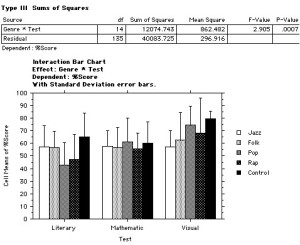In the typical university environment, students are bombarded with noise all day, in almost all places of the campus, asking them to join clubs or get excited for events or buy tickets for concerts. With the exception of libraries and designated studying areas, these students become so accustomed to their attention spans being diluted between studying and background noise-from the cell phone to Netflix droning amidst their attempts to skim through textbook chapters- that studying with music is a common practice among undergraduates. However, is the pleasurable and agitating effect of listening to music effective in lifting mood only and not aiding students in being productive and on-task? There is a difference between simply being in a better mood while studying and actually accomplishing what needs done in a studying routine, as the number of college freshmen positively identifying with their academic abilities has plummeted in the last few years. In order for students to overcome the need to engage distractions while studying, music seems like a logical accompaniment to keep positive and on-track at the same time, but the variables involved with the millions of songs out there, in conjunction with individual study habits, can show that it may be adding just one too many voices in your head.
In a study conducted at Miami University, five types of music were analyzed in composition with three types of timed, memory-based tasks-math equations, memorizing a list of words, and recreating small illustrations. Each group was exposed to the five different types of music one at a time with each task, with each genre being picked because of a unique component that could set it apart in terms of how it affects typical studying tasks, such as rap’s unique stylization and intricate use of language, as opposed to the repetition and consistency of pop. On the last night of the experiment, the same subjects performed task with no music as a form of control. In the results of the test shown below, the overall variance between the groups in all three tasks was significant. Music that included repetitive or overly varied words tended to have a negative effect on the literary and mathematical portions of the study, whereas folk and jazz did not have as significant an effect in either direction.

Music varies in mood as well as its effect on different types of tasks- the people conducting this study had that in mind as they chose different styles that would affect different capacities of learning!
In another study conducted at South Wales University, 25 undergraduates between 18-30 years were exposed to different sets of interfering noise through headphones while being asked to memorize 25 sets of 8 letters in each set. The difference in this test is that the subjects were told to actively ignore each sound, whether it was speech, noise, quiet, liked or disliked music, which addresses a point the Miami study had not. At the end of the study, the results had shown that the subjects rated a preferred music type higher in likeability and pleasantness than steady and changing speech, as well as disliked music. However, quiet was rated less than half as distracting as all other types of sound. The results were not important in this test, just the sheer physiological effect of which sound had which effect on different users was the effective end of this study. I very much liked this philosophy behind the test because different students perform differently under their own respective conditions, but the state of stress or pleasure they derive can ultimately affect their performance without leading a test to assume each subject was an equal performer with different tasks.

Work to make your music a helpful point, rather than a crutch to trick yourself into thinking you’re getting more done by getting pleasure from the music!
The average 3-hour study session by a student in university is composed of about 73 minutes of listening to music and 25 minutes of not paying attention to the task, but rather a text, social media, or some other distraction. I believe that music can help students feel “in the mood” to get some studying done, but it’s a dangerous method that can lead to more distraction if it is used the wrong way. It’s useful to keep a playlist of songs that keep your mind calm, not too hyped nor too solemn, and to maintain momentum when studying rather than adding the music to the list of things that drone on while trying to get things done. Studying habits can be creative, but nothing beats the quiet if you can stand it! One thing’s for sure from these studies: this is definitely worse than this.
http://www.edutopia.org/blog/dont-listen-music-while-studying-david-cutler
http://www.sciencedirect.com/science/article/pii/S0360131514000384
http://marineecology.wcp.muohio.edu/ns1fall02/cummins/afternoon/music/web/musicfinal.html
http://onlinelibrary.wiley.com/doi/10.1002/acp.1731/full
